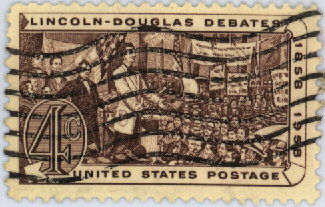FRtR > Outlines > American History (1990) > Chapter Five > Lincoln attacks slavery (6/12)
An Outline of American History (1990)
Chapter Five
Lincoln attacks slavery (6/12)
< Previous Page * Next Page >
Abraham Lincoln had long regarded
slavery an evil. In a
speech in Peoria, Illinois, in 1854, he had declared that all
national legislation should be framed on the principle that slavery
was to be restricted and eventually abolished. He contended also
that the principle of popular sovereignty was false, for slavery in
the western territories was the concern not only of the local
inhabitants but of the United States as a whole. This speech made
him widely known throughout the growing west.
In 1858, Lincoln opposed Stephen A. Douglas
for election
to the U. S. Senate from Illinois. In the first paragraph of his
opening campaign speech, on June 17, Lincoln struck the
keynote of American history for the seven years to follow:
". house divided against itself cannot stand.' I believe
this
government cannot endure permanently half-slave and half-free.
I do not expect the Union to be dissolved - I do not expect the
house to fall - but I do expect it will cease to be divided."
 Lincoln and Douglas engaged in a series of seven debates in
the ensuing months of 1858. Senator Douglas, a sturdy
five-footer known as the "little giant," had an enviable reputation as
an orator, but he met his match in Lincoln, who eloquently
challenged the concept of popular sovereignty. In the end,
although Douglas won the election by a small margin, Lincoln had
achieved stature as a national figure.
Lincoln and Douglas engaged in a series of seven debates in
the ensuing months of 1858. Senator Douglas, a sturdy
five-footer known as the "little giant," had an enviable reputation as
an orator, but he met his match in Lincoln, who eloquently
challenged the concept of popular sovereignty. In the end,
although Douglas won the election by a small margin, Lincoln had
achieved stature as a national figure.
Sectional strife again became acute. On the night of
October 16, 1859, John Brown, an antislavery fanatic,
who had struck
a bloody blow against slavery in Kansas three years before, with
the help of a few abolitionist extremists seized the federal arsenal
at Harper's Ferry in what is now the state of West Virginia.
When dawn came, armed citizens of the town, aided by some
militia companies, began a counterattack, and Brown and his
surviving men were taken prisoner.
Alarm ran through the nation. For many southerners,
Brown's attempt confirmed their worst fears. Antislavery zealots,
on the other hand, hailed Brown as a martyr to a great cause.
Most northerners repudiated his exploit, seeing in it an assault
on law and order and on democratic methods of obtaining social
progress. Brown was tried for conspiracy, treason, and murder,
and on December 2, 1859, he was hanged. To the end, he
believed he had been an instrument in the hand of God.
In the presidential election of 1860 the Republican Party
nominated Abraham Lincoln as its candidate. Party spirit soared
as leaders declared that slavery could spread no further. The
party also promised a tariff for the protection of industry and
pledged the enactment of a law granting free homesteads to
settlers who would help in the opening of the west. The disunity of
the opposing Democrats, led by Stephen A. Douglas, helped the
fledgling Republican Party win the election.
South Carolina's secession from the Union,
if Lincoln were
elected, was a foregone conclusion for the state had long been
waiting for an event that would unite the south against the
antislavery forces. Once the election returns were certain, a specially
summoned South Carolina convention declared
"that the Union
now subsisting between South Carolina and other states under the
name of the .nited States of America' is hereby dissolved."
Other southern states promptly followed South Carolina's
example, and on February 8, 1861, they formed the
Confederate States of America.
There is a WWW-site especially dedicated to the American Civil
War at http://cobweb.utcc.utk.edu/~hoemann/warweb.html,
where you can find lots of information about this subject.
< Previous Page * Next Page >
 Lincoln and Douglas engaged in a series of seven debates in
the ensuing months of 1858. Senator Douglas, a sturdy
five-footer known as the "little giant," had an enviable reputation as
an orator, but he met his match in Lincoln, who eloquently
challenged the concept of popular sovereignty. In the end,
although Douglas won the election by a small margin, Lincoln had
achieved stature as a national figure.
Lincoln and Douglas engaged in a series of seven debates in
the ensuing months of 1858. Senator Douglas, a sturdy
five-footer known as the "little giant," had an enviable reputation as
an orator, but he met his match in Lincoln, who eloquently
challenged the concept of popular sovereignty. In the end,
although Douglas won the election by a small margin, Lincoln had
achieved stature as a national figure.